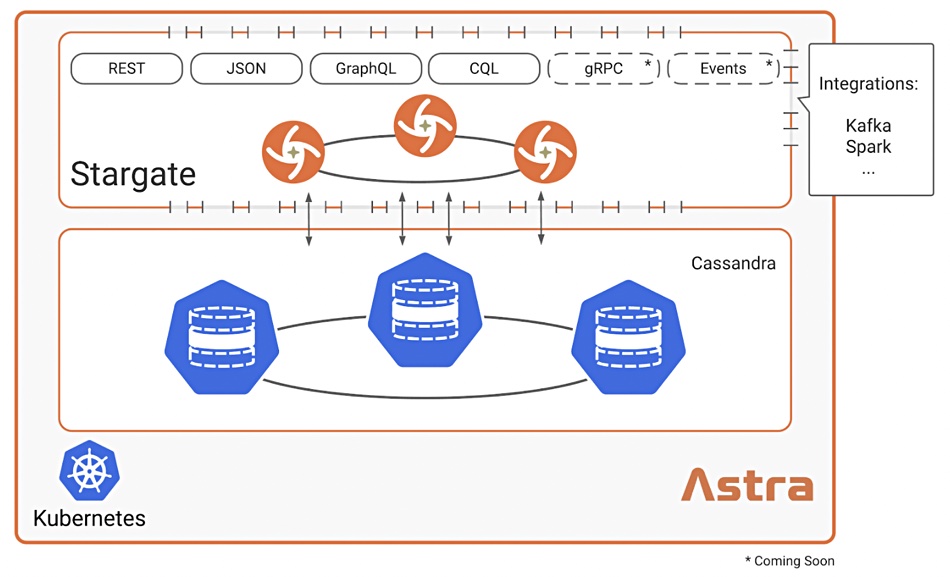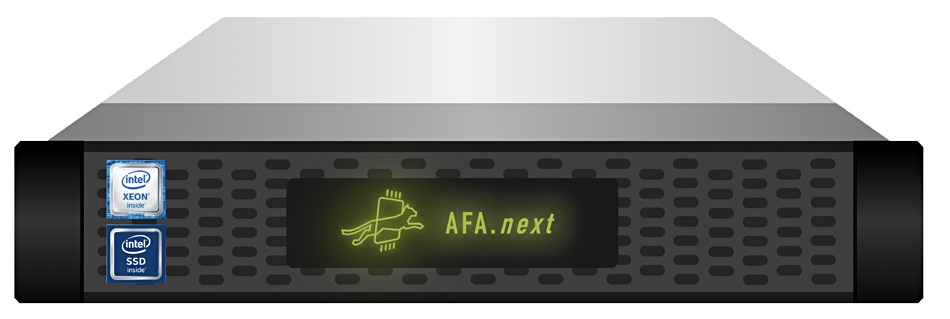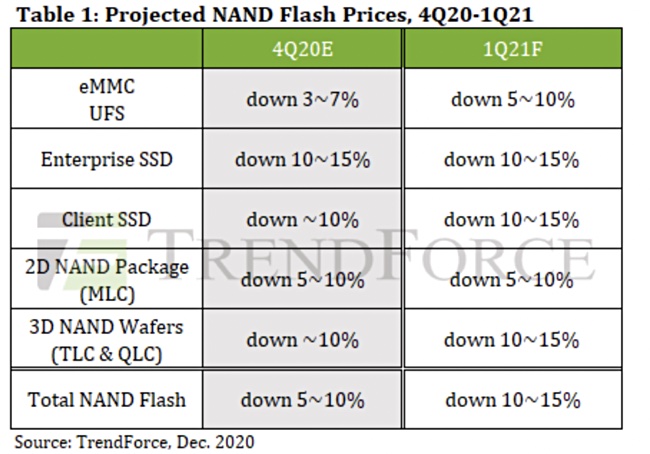Here is a near-final storage digest for 2020 with news from NoSQL-er DataStax, fast Optane and QLC NAND storage array supplier StorOne. and research business TrendForce on forecasted flash chip price movements.
There us a host of shorter product, company and customer win news as a dessert to this meal.
But first, an apology. There is no Acronis news. The company has apparently run out of partnership news and product update announcements. Normal service is sure to be resumed asap though.
DataStax builds Stargate data fabric
DataStax has developed a gateway API stack to let developers access its cloud-native NoSQL Astra Cassandra database-as-a-service from different environments.

Called Stargate, the “open source data gateway… sits between your app server and your databases. Stargate brings together an API platform and data request coordination code into one open source software project,” DataStax chief data officer Denise Gosnell said in a blog post.
Stargate enables developers to use any data store for cloud-native data apps by adding support for new APIs, data types, and access methods. These include schema-less data stores, serverless architectures, JSON APIs, the GraphQL language, gRPC and REST APIs.
And why is DataStax doing this? “Developers tell us they want easy and quick access to their data from the languages and tech stack of choice, Ed Anuff, DataStax Chief Product Officer, said in the launch release. “Stargate will help millions of full-stack developers work with any shape of data or type of data store they want.”

It is as if a single virtual transport hub has been developed to enable road, rail, sea and air traffic controllers to use a single traffic management infrastructure. Netflix’s Vinasy Chella, Apache Cassandra committer, engineer and cloud data architect, said in a statement: “The ability to quickly and easily integrate data in Apache Cassandra with other apps is a major achievement.”
Our sister publication The Register has more about DataStax Stargate here.
StorONE price performance
StorONE AFA.next arrays containing Optane SSDs deliver more than 1 million IOPS for less than $50,000 according to benchmarks tests by the Evaluator Group.
There were four Optane SSDs in the tested array node. They provide a storage tier along with a slower QLC flash capacity storage tier. Cooling data is moved from the Optane to the QLC tier.

The Evaluator Group put StorONE’s AFAn through a series of tests to verify performance on various workloads with block sizes ranging from 4K to 128K, measuring read and write IOPS, as well as latency. It found the array provided over 1 million read IO/s at sub-1 ms latency for transactional (4KB) workloads. With larger 32KB reads there were 223,182 IOPS at 0.86 ms latency. For even larger 128KB reads the array delivered nearly 7GB/sec of read bandwidth.
Falling NAND drive prices
Research firm TrendForce expects NAND Flash ASPs to undergo Q/Q declines throughout 2021, since the number of NAND suppliers far exceeds DRAM suppliers, and the bit supply remains high. As Samsung, YMTC, SK Hynix, and Intel actively expand their NAND Flash bit output in 1Q21, oversupply will become more severe, with a forecasted 6 per cent QoQ increase in NAND Flash bit output and a 10-15 per cent QoQ decline in NAND Flash ASP in 1Q21.
As price competition between PCIe SSD suppliers intensifies, enterprise SSD prices are expected to drop by 10-15 per cent QoQ.

Demand for enterprise SSDs is similar to server DRAM, as they are both affected by the traditional off-season for branded server manufacturers and the continued inventory de-stocking from data centre clients.
Before the ramp-up of Intel’s next-generation Whitley Gen 2 – Ice Lake platform, the volume of enterprise SSD orders will undergo a further decline in 1Q21 compared to 4Q20.
Shorts
Altaro has announced that customers of Altaro VM Backup can now back up any virtual machines running on Azure Stack HCI for free until 30 June 2021.
Arcserve has introduced multi-petabyte X Series appliances secured by Sophos. These are self-contained systems with integrated cyber and data protection for enterprise data volumes. They combine deep learning endpoint protection and on- and off-site disaster recovery with over 3PBs of effective capacity in one unit, and linear expansion to increase capacity as needed.
AWS has announced a multi-year collaboration with Metro Goldwyn Mayer (MGM) to support its core media supply chain and enterprise-wide media distribution platform. MGM is migrating its content library and SAP workloads to AWS to power its media supply chain as well as support its content rights and distribution processes. MGM will build an S3 data lake on AWS to provide up-to-date content rights and ownership information and connect to a microservices architecture that will automate workflows and processes.
Fujitsu is offering Veeam Cloud Data Management to SME customers.
File data manger Komprise announced its availability on AWS GovCloud (US), along with additional security capabilities such as ransomware protection on AWS through object locking.
Composable systems supplier Liqid announced support for Arm-based servers, expanding Liqid’s ability to deliver composable resources across heterogeneous compute platforms. Liqid will introduce Gen 4.0 PCI-Express (PCIe)-based composability for the Ampere Altra Mt. Jade dual-socket Arm server.
Liqid has paid for an Evaluator Group report which finds that Liqid’s fabric-based composability is better than alternative blade server-based composability, such as HPE Synergy.
Nvidia says Microsoft’s updated Azure Stack HCI platform service supports Nvidia’s zero-touch RoCE (ZTR) technology. ZTR technology, embedded in ConnectX SmartNICs and BlueField data processing units (DPUs), eliminates the need for special network configurations such as flow control or congestion notification, enabling RoCE to be deployed with zero network changes. With ZTR, RoCE network transport services operate side by side with non-RoCE communications in ordinary TCP/IP environments.
SingleStore, the rebranded MemSQL, announced $80m in new funding, taking total funding to $238m and a partnership with SAS. It will spend the money on engineering, sales and marketing.
Redis Labs has achieved AWS Outposts Ready designation. This means customers can run Redis on-premises with AWS Outposts, as well as in a hybrid-cloud deployment. This coincides with Redis Labs announcing that it has seen 63 per cent customer growth over the last 2 quarters with Redis Enterprise Cloud on AWS.
Data protector and manager Rubrik has won a $10m-plus deal with a classified agency within the US public sector via channel partner ClearShark. Rubrik will orchestrate the movement of data between on premises locations and cloud environments across multiple regions.
Storage Made Easy (SME) announced a new release of its Enterprise File Fabric, which integrates File and Object Storage into a single platform accessible through a global file system. The File Fabric’s SMB connector has been updated enabling SMB shares to no longer be restricted by boundaries of the office, facilitating cloud-like working with SMB shares without the need for VPN or VDI.







